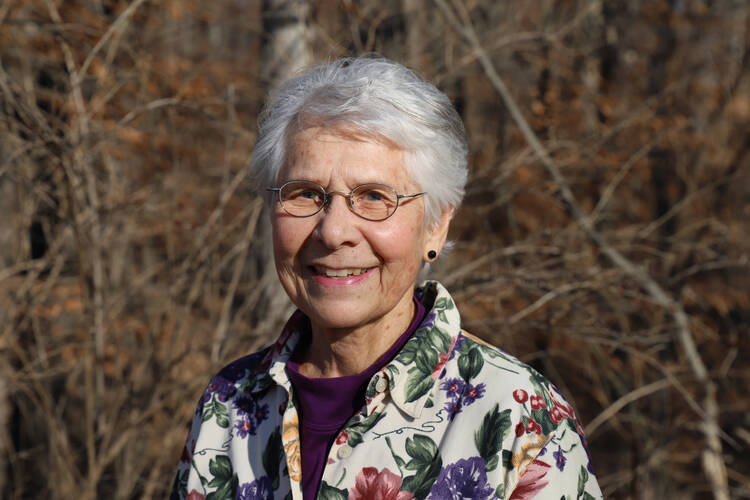Earlier this year, I wrote areview for America that looked at three excellent books on aging and mortality, written by three very different authors—Sebastian Junger, the author of the now-classic adventure story The Perfect Storm, who wrote about a near-death experience after an accident; the America contributing writer Valerie Schultz, who looked at what it means for women to age; and the spiritual writer and poet Joyce Rupp, O.S.M. Of the three, perhaps Sister Joyce is the one whose book under review, Vessels of Love, was not a surprise for her fans.
In other words, Joyce Rupp, the guest on the latest episode of “The Spiritual Life” podcast, has established herself as an expert on the spirituality of aging. This is not because she is 100 years old; rather, her warm, wise and accessible books on letting go with freedom and growing old with grace have helped tens of thousands of readers as they turn the pages of their calendars. Perhaps her most well-known book is Praying Our Goodbyes, which looks at how to accept the inevitable farewells that come with life. (Since my review, she has published another book, Years of Ripening: Reflections on Aging in Later Years.)
Not all of Sister Joyce’s books are about aging. One of my favorites is her beautiful book Fragments of Your Ancient Name, a compendium of psalm-like meditations addressed to God. My favorite, called “Beckoner,” begins, “You tap at the window of my heart/ You knock at the door of my busyness…” A few years ago, it made the perfect beginning to my annual retreat.
What is remarkable about Sister Joyce’s wisdom is that it is for everyone, not just people in the second half of life. In our conversation on “The Spiritual Life,” she emphasized the importance of trust, self-acceptance and finding meaning in your inner life, no matter what stage of life you are in. She also addressed themes of diminishment (something more clearly associated with the elderly) as well as letting go of resentment (something that people of any age must learn to do). And she noted that older adults who exemplify openness, wisdom and compassion can be not only wonderful spiritual directors but treasured role models and mentors for the young.
At one point, Sister Joyce mentioned that, on the whole, she enjoys getting older. She finds special consolation in being versus doing. As my own novice director used to say, “We’re human beings, not human doings.”
What enables us to move toward this freedom? There are many reasons, but Sister Joyce and I agree on an essential one: the release of the pressure of having to, as she says, “please other people.” Nothing in my life has been as freeing as the realization that not everyone is going to love, like or approve of me. If you had asked me in high school or college whether it would ever be possible for me to reach this point, I would have said no. (Actually, I would have probably lied and said, “Oh, I don’t care what people think,” since I wanted people to think I was free!)
What enables a person to reach that state? (And I’m certainly still en route.) For one thing, it is the unavoidable realization that comes in later years that it is impossible to control whether someone will like you because most of the reasons are outside of your control. You may look like someone whom they hated a long time ago (or hate now). They might be jealous that you are younger or wealthier or perceived as “better looking.” In other words, the old saying “It’s not about you, it’s about them” explains why some people may take an instant dislike to you. (I’m presuming that you have not done anything terrible to the person!) Your political or even ecclesial views might be at odds with theirs, which breeds resentment in them.
Years ago, I lived with a Jesuit who despised me. And that is not too strong a word: For about 10 years, he refused to speak with me. In all the years that I lived with him, despite several attempts at reconciliation, I never found out why he disliked me so intensely. Not long ago, he died, and there was, despite the usual happy tales in this kind of story, no reconciliation, though I tried.
In the end, a gift that he gave me was the hard realization that not everyone will like you and that some people may detest you. And often you can do little about it. Remember that when Jesus says we should “love our enemies,” it means that he expects that we will have them! There is, as Sister Joyce notes in our conversation, great freedom in simply accepting that and then not wasting time trying to please people or getting them to like you.
Sister Joyce and I talked about all this in our conversation. And from a more strictly spiritual point of view, she also shares her perspectives on how our very understanding of God can evolve as we get older. The importance of maintaining an open and receptive attitude toward spiritual growth and direction throughout one’s life, no matter one’s age, is essential. Indeed, this is the one relationship, with God, where you can always assume you are loved—and even liked.
I’m so grateful for poets and writers like Sister Joyce Rupp, whose deep stores of wisdom help all of us to grow into a mature and mellow freedom, whether we’re 18 or 80.








